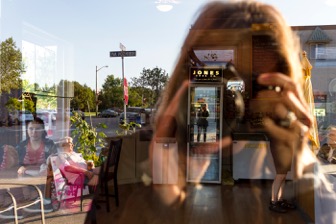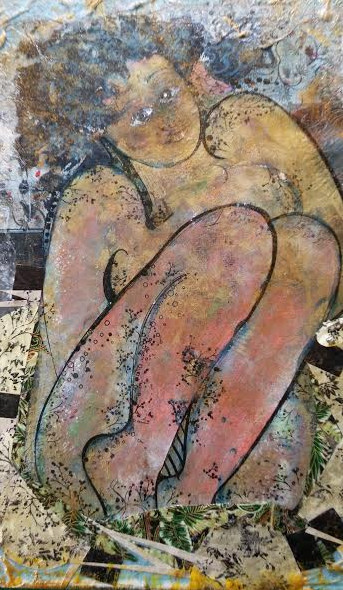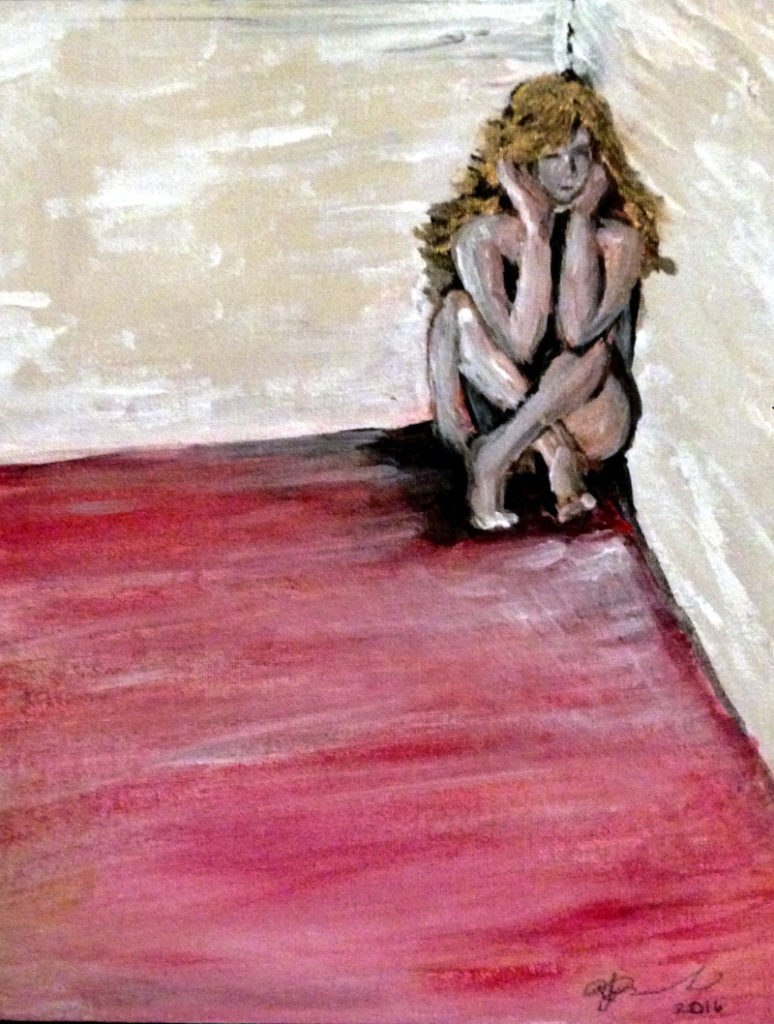When my son was six he put his stubby finger under the word “Mom” in a book we were reading. “What’s that?” he said. Why that’s me, I thought. Or at least the me I thought I would be. Mom: freezing at the ice rink, stamping her feet, watching her son play hockey. Instead, I’m Mum: drenched at the pitch side, shaking my brolly, watching my son play rugby.
I always thought my children would grow up Canadian, surrounded by family, their grandmother a daily presence in their lives, rather than an occasional visitor. I imagined outings with my siblings and our respective children, taking part in typically Canadian activities: summer barbeques, an autumn weekend picking the perfect pumpkin, and tobogganing or skating all winter. This vision survived even after I left Canada at the age of thirty-eight, and even after I gave birth to my children in the United Kingdom. It simply never occurred to me that they would be culturally different from me.
But they are British to the core: to-mah-to not to-may-to, wellies not boots, and field hockey not ice. When Canada won the gold medal for ice hockey at the Sochi Winter Olympics in 2014, I was ecstatic. It brought back memories of the 1972 Canada-USSR Hockey Series, an event deemed so culturally significant that televisions were wheeled into school classrooms so we didn’t miss a game. Yet my offspring were indifferent to Canada’s Olympic glory. I should have known better. They are growing up exactly as I did: in a country far away from grandparents, cousins, aunts, and uncles,with their own interests and a heritage I will never completely share.
I moved to the United Kingdom forty-five years after my parents left Ireland for Canada. The daughter of outsiders became one herself. For my parents, immigration was a leap into the unknown. My father left his job in a bakery with the hope, but no promise, of better prospects abroad. My mother was lucky enough to secure a nursing position in Canada before she left Ireland. But neither of my as-yet-unmarried parents knew much about their future home.
My mother likes to tell the story of how she ordered tea during a layover in New York. The waitress presented her with a small pot of hot water, a cup and saucer, and a tea bag on the side. My mother had never seen a teabag before and had to ask the waitress for instructions. I imagine my mother wanting to laugh about her ignorance with one of her sisters back home. But letters were rare; phone calls unheard of. Apart from one trip home to show off her first-born child, it would be thirty years before my mother returned to Ireland.
I had no reason to leave Toronto; I was blessed with a good job, a large circle of friends and my family close by. But one’s heart isn’t bound by logic. When it was time for my British boyfriend to go back to the UK, he asked me to go with him and I did. In some ways it was easier for me. Email and cheap long distance meant I could easily share my own blunders (such as asking a sales clerk if they stocked leather pants instead of trousers) with family and friends. Like my mother, I made a return trip to Canada to show off my first-born. Unlike her, this was one of countless visits over the years for occasions such as my sister’s fiftieth, my mother’s eightieth, and annual summer visits to the family cottage. Here, my children were at their most Canadian. They swam in the lake, battled black flies, made campfire s’mores and celebrated Canada Day with sparklers and fireworks.
Looking back I sometimes wonder if my frequent escapes back “home” spoke to some deeper ambivalence towards immigration. I am certain they hindered my settlement in England. I was so desperate to maintain contact with my Canadian friends that I clung to them, to the detriment of any new friendships.
Were my parents less ambivalent? I don’t remember. But I know they joined a large and sociable group of immigrants in Sudbury. This mining town, with its rich mineral base, promised jobs and prosperity to the many newcomers who arrived from Italy, Finland, the Ukraine and other far-flung places. Friends and family from Ireland joined my parents, some staying only a few months, others much longer. The Irish community stuck together; both my mother and father took it in turn to be President of the Irish Club.
When I look back on my childhood, I’m in awe of how my mother threw herself into her new life. Irish dishes—soda bread, stew and of course the mighty potato—featured prominently in her cooking repertoire. But she also proudly served up cabbage rolls, spaghetti and tourtière—recipes learned from her Ukrainian, Italian and French Canadian co-workers and friends. She taught herself to skate by pushing a chair around the ice rink flooded in our back yard every winter. She learned to ski, both downhill and cross-country. My mother embraced all that Canada represented, even during its most challenging season.
My move to England was a less stereotypical migration than my parents’. I didn’t arrive with a wave of Canadians seeking work and a new life. I needed only to book a flight, thanks to my Irish passport, which also functioned as a work permit. I quickly found a well-paying job and moved in to my (now) husband’s London flat. With a Starbucks across the road from the office, even my morning fix was unchanged.
I faced none of the traditional stumbling blocks. But I have struggled, nonetheless, to fit in. Sixteen years on, I may have adopted some British vocabulary, but my accent is still remarked on almost daily, my choice of words or phrasing still slightly off. Once, my husband texted from our son’s cricket match, “He just stumped someone.” I texted back, “Is that a good thing?” only half in jest. Despite volunteering as the manager for my daughter’s netball team, I don’t understand all the rules. Nor has my mother’s international cooking repertoire been entirely replicated. I deemed the iconic Victoria sponge cake impossible after many early failures and the classic British roast dinner, with Yorkshire pudding and gravy, still unnerves me.
I don’t seem to have tried as hard to fit in with my new country as my parents did. I don’t know why but age surely plays a part. My parents were much younger and less settled when they immigrated; I was a more finished product and less willing or able to adapt. Pushing forty, I was well out of my comfort zone learning to drive a stick shift (a prerequisite to obtaining a UK drivers’ license), making new friends and navigating the myriad differences between Canada and the UK. If I’d been able to find a Canadian Club, I’d have gladly drunk from that cup.
Geography was also a factor. My parents’ accent didn’t stand out in Sudbury; they were surrounded by the voices of their own and other countrymen. But once my little Brits were born, we moved from London to the countryside. There are very few immigrants in my town so as soon as I open my mouth, even now, the questions come.
But I am, slowly, adapting. I have now been abroad for one-quarter of my life and the links to Canada are diminishing. With the sale of our cottage last summer, I fear we will spend less time in Canada and perhaps none when my mother passes away. At some point I stopped reading the Globe and Mail newspaper online. At some point email and phone exchanges with girlfriends back home became exceptional rather than routine. I watch my children play field hockey, rugby, cricket, netball and rounders. I make them tea, not supper—and I can whip up a Victoria sponge in thirty minutes and bask in the compliments. (It turns out I was using the wrong size baking tin. Or do I mean pan?) I have also adopted the great British tradition of a bracing walk in the countryside, no matter the weather, and am pleased to count it as one of my favourite things to do over here. But even after fifteen years as Mum, I still mourn my doppelganger back in Canada. I can almost see her, Tim Horton’s coffee in her mittened hand, hunkering down for another session at the ice rink, her breath freezing in the air.


 I’m sending a photo from the exhibit Canary in the Coal Mine. The polar bear is the canary, much like I am—a person with MCS in constant search for safe housing and basic needs—although even living in a zoo, a so-called safe place, polar bears are now getting human diseases, an early indicator of an unnatural and toxic environment. And the children in the photo—like our children’s and grandchildren’s future—are fragile, just a reflection on the glass. The photo looks so beautiful and elegant yet it represents a warning sign of what is happening to the human population. Are we the beginning of the end of the human species?
I’m sending a photo from the exhibit Canary in the Coal Mine. The polar bear is the canary, much like I am—a person with MCS in constant search for safe housing and basic needs—although even living in a zoo, a so-called safe place, polar bears are now getting human diseases, an early indicator of an unnatural and toxic environment. And the children in the photo—like our children’s and grandchildren’s future—are fragile, just a reflection on the glass. The photo looks so beautiful and elegant yet it represents a warning sign of what is happening to the human population. Are we the beginning of the end of the human species?



